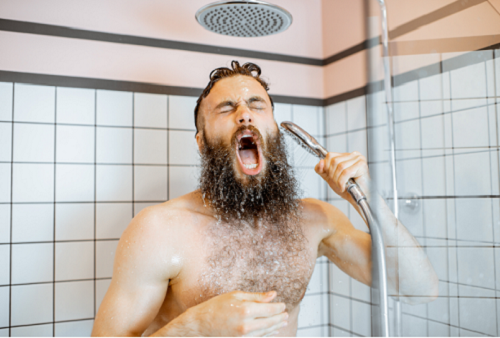Do you ever wonder, “is shower water safe to drink?” After all, whether from the kitchen tap or bathroom sink/shower, both are just water and will do their job of quenching your thirst. Well, drinking a small amount of shower water will not harm you. If you must drink shower water, for one reason or the other, make sure you let the shower run for some time to flush out toxins and contaminants that may be lurking in it. Otherwise, you shouldn’t make a habit of drinking shower water for various reasons. One of the reasons is that the shower tap is always moist, and this creates a breeding ground for mold, rust, and bacteria that may make you sick.
Let’s explore this topic further.
How Clean Is Shower Water?
To answer the question of how clean shower water is, it is important to first understand where your shower water comes from. In most homes, all plumbing fixtures, including the shower, uses the same water supply. This could be a well, a municipal water system, and, less likely, a rainwater collection tank.
Sometimes, more than one water source may be used, but this will depend on your location and fixture type. For instance, most houses in rural areas are connected to a well; as we may already know, wells are not controlled by the EPA. Meaning the cleanliness of the water lies wholly on the owner. The owner will have to check with an accredited water testing lab or local health department to ensure their tap water is safe for use.
On the other hand, nearly all houses in urban centres use a public water supply system, which EPA manages. They are the ones that set standards for pollutants and contaminants of the water that end up in your tap. Therefore, it is important to be aware of the state of the municipal water where you live.
So, you might notice a horrible taste in your shower water because it is not distilled or bottled. Since you’re likely to use a home purifier in the kitchen tap in such cases, your shower water will remain unpurified and, therefore, not good for drinking.
Reasons Why Shower Water Is Not Safe To Drink
While you are unlikely to die from drinking shower water, you’re better off drinking cold water from your kitchen tap. Here are reasons why drinking shower water might be a bad idea.
Old Pipes
If you have an older home, chances are that the piping was done using lead or galvanized steel, both of which are toxic contaminants.
Lead and steel metals dissolving in your water can be harmful, especially for children, and could even lead to poisoning.
Children exposed to lead may experience lower IQ, slowed growth, damage to the brain, hearing and speech problems, and damage to the nervous system.
Pregnant women, on the other hand, may experience premature births. It’s not just children and pregnant women who deal with the negative effects of drinking lead water, but everyone. Even adults might have to deal with increased blood pressure after drinking this water.
You will know that you have lead poisoning when you experience abdominal pain, increased blood pressure, constipation, irritability, and headaches. Lead poisoning can be fatal so make sure you see a doctor if you experience the above symptoms.
The lead particles in water can also alter its taste, appearance, and odor, making it unsafe for drinking. Therefore, if you’re one of the older homeowners, it is important to have your bathroom water tested. Also, you should replace old pipes with current materials like copper and PVC.
Old, Stained, or Dirty Shower Head
Studies have found shower heads to be breeding grounds for different disease-causing bacteria. This is because, while everyone is always concerned about the cleanliness of the bathroom, very few people remember to clean their shower heads. A dirty shower head may contaminate your shower water, making it unsafe for drinking.
Also, stained and old shower heads can accumulate minerals and rust, which may end up in your water if not replaced.
Rust and mineral build-up are not the only things you should be worried about. Shower heads can also have bacteria growing on them, which can cause serious respiratory infections and other conditions.
Water Heater
A poorly maintained water heater can be a breeding ground for bacteria, which makes your shower water unsafe for drinking. Hot water makes the pipes corrode quickly. Therefore, you might find yourself consuming dissolved metals or lead when you drink shower water.
The heightened temperatures also affect the chlorine in the water, making it ineffective in preventing the growth of bacteria. That means, in one way or the other, the water from your shower will have a different taste and odor compared to the one from your kitchen tap.
Stagnant/Uncovered Water in a Storage Tank
Water stagnation happens when you have a huge tank or you have a problem with water flow/ system blockage. This stagnation might attract harmful bacteria into your water tank, making it unsafe for drinking.
Water stored in uncovered storage tanks can also be contaminated and rendered unsafe to drink. An uncovered tank can attract outside pollutants such as animal waste, bird droppings, leaves, and other dirt that collect at the bottom of the tank, causing bacteria growth.
Using Water Softeners
As the name suggests, water softeners are used to soften hard water. They do this through a process called ion exchange, where calcium and magnesium ions are exchanged for soft sodium ions.
For someone on a low-sodium diet, adding excessive sodium ions to your water can make it unsafe for drinking. So, as much as you can use this water for bathing and washing clothes, it may not be safe for drinking.
FAQs
Is Shower Water Same as Tap Water?
In most homes, especially those in urban areas, all the home fixtures, including the kitchen, shower, and toilet, use the same water source. Some houses are connected to more than one water source, like connecting a well to the shower and using municipal water in other areas of the home, like the kitchen.
We also have places where toilets use gray water (water that has already been used by other systems).
Is Cold Shower Water Safe to Drink?
As we have seen from the above discussion, many variables make shower water unsafe for drinking, whether warm or cold. So, stick to drinking bottled or kitchen tap water unless it’s an emergency.
Can You Die from Drinking Shower Water?
No, you won’t die from drinking shower water. But we have seen that shower water contains several bacteria that can make you sick.
Final Thoughts on, Is Shower Water Safe to Drink?
It’s okay to drink shower water, but only in small amounts, like a gargle, when brushing your teeth. You will not die from drinking shower water, but continuously doing so and in large quantities can lead to some serious health concerns. This is because of mold, rust, and other bacteria present on the shower head and tap. Besides, shower water may have an odd taste and odor because of rusty metallic pipes. You’re better off taking kitchen sink water which tastes better because of the aerator that is affixed to kitchen taps. The aerator adds a little bit of air into the water, making it taste better.



